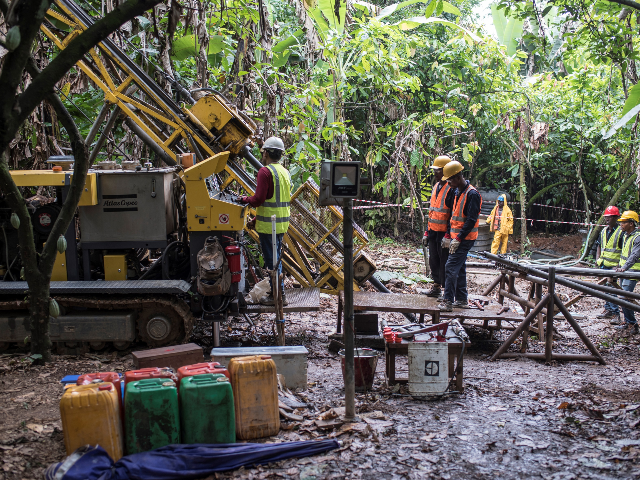A report published by the Nigerian branch of the Extractive Industries Transparency Initiative (NEITI) on Monday found that 68 percent of the minerals exported by Nigeria in 2017 were sent to China.
Malaysia and Vietnam were Nigeria’s other top customers, accounting for 6.5 and 4.4 percent of exports respectively.
The NEITI report was cited somewhat disapprovingly by the Premium Times of Nigeria, which worried that exports to China “may be based on demand but also based on the increasing trade and partnership between China and Nigeria.” A good deal of that partnership is based on Nigeria taking out enormous loans from Chinese banks over the past two decades.
Nigeria’s top mineral exports include limestone, zinc, lead, and silicates. The limestone industry is especially widespread, producing materials used in everything from road construction to “paper, paint, plastics, tiles, and even toothpaste.” Limestone alone constitutes about 55 percent of mineral production in the country.
The Premium Times cited concerns about the effects of air pollution from quarrying:
Quarrying in Nigeria is a major subsector in the construction industry, it is where solid minerals are blasted or crushed for construction use.
Besides air pollution, quarrying activities have a number of effects like land degradation, water pollution, and occupational noise pollution will lead to health-related problems.
According to The World Health Organisation estimate, seven million people die prematurely every year from air pollution-related diseases, including strokes and heart disease, respiratory illness and cancer.
“Many pollutants which damage health also harm the environment and contribute to climate change. These include black carbon from diesel engines, cooking stoves, and waste incineration, and ground-level ozone, which are harmful but are short-lived in the atmosphere,” WHO said.
The China Civil Engineering Construction Corporation (CCECC) announced this week that it has broken ground on Nigeria’s first rolling stock assembly plant, a major contribution to modernizing the Nigerian railroad system. The plant is expected to require about 5,000 employees.
The Chinese embassy in Nigeria credited Chinese firms with investing some $3 billion in Nigeria and creating thousands of jobs. Chinese officials said the trade volume between the two countries grew to $8.6 billion in the first half of 2019.
“Nigeria is surely marching to greater development and the CCECC will continue to partner with Nigeria in ensuring the technological development of the country,” said CCECC managing director Jiang Yigao.
China’s Huahua Media last week announced the first movie co-production with a Nigerian company, a film called “30 Days in China” that will star a popular Nigerian entertainer named Ayo Makun. Makun has appeared in several of Nigeria’s highest-grossing films. The current Nigerian box office champ is the American superhero movie Black Panther.
Variety noted Huahua Media has been making hefty investments in foreign films to increase China’s clout in the industry, including big-budget entries in American franchises such as Godzilla, Transformers, and Star Trek.
“In recent years, the Chinese government has actively tried to increase its soft power across Africa. Economic ties between Nigeria and China are already strong, with the Middle Kingdom ranking behind only the U.S. as Nigeria’s biggest trade partner,” Variety observed.

COMMENTS
Please let us know if you're having issues with commenting.